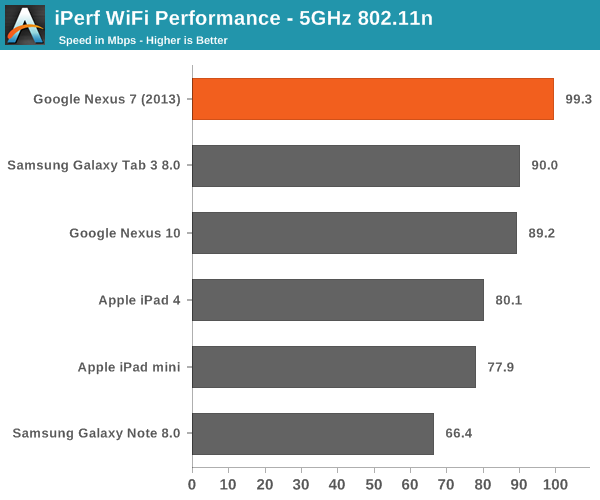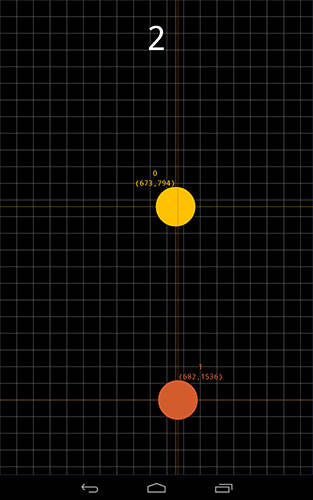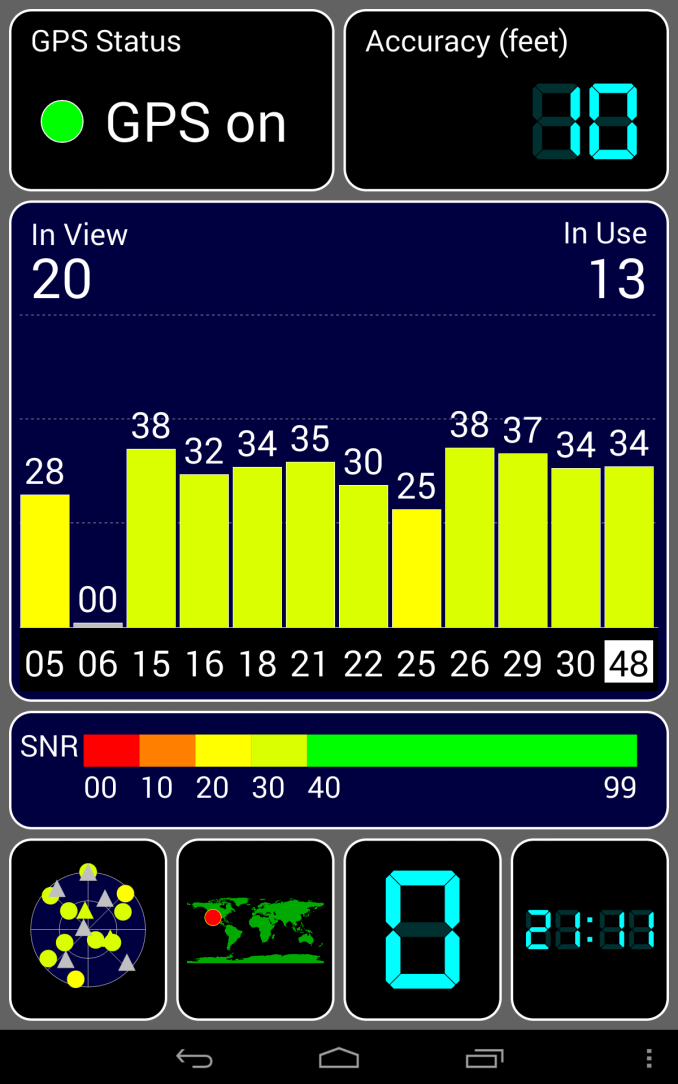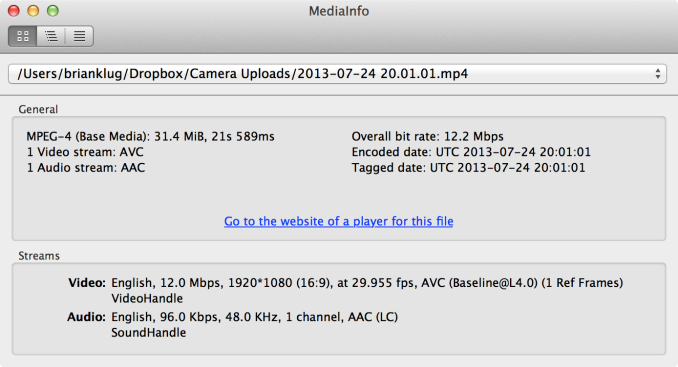The Nexus 7 (2013) Review
by Anand Lal Shimpi on August 22, 2013 6:00 PM ESTWiFi, GPS
I won't spend too much time on either of these points as Brian already did so in his initial review. WiFi duties are handled by Qualcomm's WCN3660 WiFi combo chip. The new Nexus 7 sees an update to include 5GHz 802.11n support, which is a very welcome addition. There's no 802.11ac, understandably for cost reasons. 802.11ac is probably the only thing missing from this otherwise awesome platform.

When it comes to GPS, there's good news and bad news. The good news is that Qualcomm's GNSS implementation remains the fastest we've tested as far as time to lock is concerned. The bad news is there seems to be an issue with the Nexus 7's impementation, likely in software, that results in the tablet randomly losing GPS lock. Update: It looks like this has been fixed!

Note that neither my Nexus 7 nor Brian's have exhibited the instability or consistent reboots that I've seen reports of. I had a single unexpected reboot during my GPS testing but that was it. Brian's sample has been running with over 22 days of constant uptime at this point. I also haven't seen any multitouch issues on my Nexus 7, although touch controllers are sometimes sourced from multiple vendors which could explain some of the issues others are seeing. Update: Looks like this one is fixed too!
Camera
The new Nexus 7 adds a 5MP rear facing camera, something its predecessor didn't have at all. While I rarely use my tablet for taking photos, I will admit the absence of a rear facing camera on the old Nexus 7 caught me off guard. Image quality out of the rear camera is decent. I threw together a gallery comparing the Nexus 7's rear camera to the iPad mini, MeMO Pad HD7 and Galaxy Tab 3 8.0:
In well lit situations and if you're sharing photos at lower resolutions, the Nexus 7's camera isn't bad at all. It's not the best thing in the world but in a pinch it's fine. I also threw in iPhone 5 samples as a reference in the gallery above.
Video on the Nexus 7 (2013) is 1080p30 at 12 Mbps, H.264 Baseline with 1 reference frame, and 96 kbps 48 KHz single channel AAC audio.


















202 Comments
View All Comments
solipsism - Thursday, August 22, 2013 - link
With the Amazon Kindle Fire having the same size display, aspect ratio, running Android (even if it is a more limited version of it), and being at the same $199 price point I wonder why the Kindle Fire isn't compared directly with the Nexus 7.jeffkibuule - Thursday, August 22, 2013 - link
Because it's a more limited version of Android, and software really is everything. Unless you are really into Amazon's ecosystem or just absolutely love hacking software onto hardware, the Kindle Fire isn't a device that should be recommended over the Nexus 7 (2013).hugh2323 - Thursday, August 22, 2013 - link
Have you even used a Kindle Fire? They are so locked into Amazon they are useless as a general purpose tablet. And hacking them is not easy, if possible at all with newer models.BigLan - Thursday, August 22, 2013 - link
I've had the GPS problem on 2 units now - took the first one back which wouldn't last more than 5 minutes without loosing a lock.I've avoided using the google maps/nav app which seems to have worked. I had one gps drop for the first 2 weeks (after copilot crashed) but after update Maps the other day the issues started up again. I uninstalled the update and disabled Maps and it seems to be working again.
I know this is just an anecdote, but maybe it'll work for someone else.
BigLan - Thursday, August 22, 2013 - link
I think that's because Anand is one of the few sites that test at a standard brightness. Most of the other reviews will just use a standard % like 50% which on the new N7 is the same as running the 2012 model at 90% brighness.I haven't seen battery life as long as Anand's numbers though, even using auto brightness which seems like 30-50%, but I do use the gps and play some games which will impact battery life.
It'd be nice to see an idle battery life test as I've seen people complaining about the device losing 10% of the charge daily when unplugged. I know that's be harder (and take much longer) to test, but I've noticed that my adroid devices do drain faster than ios ones do.
teiglin - Thursday, August 22, 2013 - link
You don't need to remind Anandtech readers why brightness-calibrated battery tests are the only reasonable way to test battery life. Percentage tests crack me up every time I see them.I'd also be interested in seeing some sort of idle test, but the things that cause battery to drain while in "standby" are very hard to pin down. Fully power-gated current draw is going to be basically zero for any modern SoC, so that's not really at issue--what causes idle drain is things that wake the device, but usage varies so much that you could argue the issue is not testable--most people probably use push email, so how many emails do you get in a day? Some people may only get half a dozen, while others get hundreds or even more. Do you use Google Now and its location-seeking wakes? Do you let your social networking clients check all the time (some default to ridiculous levels like automatically checking every 15 minutes)?
That doesn't even take into account smaller concerns like signal strength and bluetooth devices--my thoroughly unscientific testing puts the former at around a 1%/hr swing on my phone, while the latter can drain nearly 2%/hr despite being in deep sleep the whole time. I consider "good" idle drain on my phone to be under 1%/hr, though realistically I'm usually a bit higher than that.
That's not to say the issue isn't worth investigating--I'd love to see testing using Brian's base station emulator, and a regular interval for waking with fixed workload at each wake--say, wake every 10 minutes, scan wifi/cellular for location, and receive 1MB of data, or something--but the fact remains that individual circumstances are going to be the absolutely dominant factor in any idle scenario.
As a final note to your iOS comparison, iOS obviously has the advantage of tight controls over how apps can wake the device, so most people will have fewer issues with rogue apps causing high idle drain. Combined with the lack of aggressive Google Now location services, it's not hard to see why iOS tends to do better on battery than Android.
jeffkibuule - Thursday, August 22, 2013 - link
Brian Klug recently stated that an app like Reddit HD, a very popular Reddit client on Android, mindlessly checks for new messages every 15 minutes. That's incredibly wasteful and one of several reasons why Android battery life numbers can easily be all over the place depending on what you have installed.teiglin - Thursday, August 22, 2013 - link
Exactly, dumb apps like that are why the plebs think android has bad battery life. It's unhelpful to said plebs to say "it's not Android's fault" since it is, as far as they know/care, but imo, if you have standby time issues but can't/won't use BetterBatteryStats or similar to determine why, then you're probably better off getting an iPhone (or Windows Phone, if that's your cup of tea).Impulses - Friday, August 23, 2013 - link
That's totally accurate and yet a lot of people would take offense at it... Android gives you a bit more freedom, which is great for some, but it's just more rope to hang yourself with for others. I think both OS approaches have plenty of merit in this world.sprockkets - Thursday, August 22, 2013 - link
ever going to review the nexus 10?